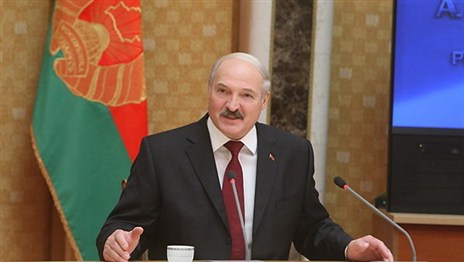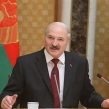
Public Opinion and Hi-Tech Startups in ‘Europe’s Last Dictatorship’
Publication: Eurasia Daily Monitor Volume: 10 Issue: 39
By:

Independent Belarusian analysts continue to mull over the results of the December 2012 national survey by the Independent Institute for Socio-Economic and Political Studies (see EDM, February 1). According to Alexei Turovsky from the Agency of Political Expertise, the support base of President Alyaksandr Lukashenka does not exceed 40 percent of the electorate. Indeed, 39 percent of the respondents trust Lukashenka (whereas 49 percent distrust him), 35 percent believe his policies are honest and fair, 34 percent say it is good that political power is concentrated in his hands, and just 34 percent credit the Belarusian leader for overcoming the economic crisis (www.nmnby.eu/news/analytics/5085.html).
At the same time, only 20 percent of the respondents trust the opposition while 56 percent distrust it; and the overall share of those trusting the 2010 presidential hopefuls makes up only 12 percent of the population. Turovsky believes there is a chasm between the viewpoints of the opposition and the interests of the citizenry. The opposition is fixated on revolutionary rhetoric, but only 3.1 percent of Belarusians are in favor of armed struggle with the “regime.” Just 4.7 percent support the West’s economic sanctions against Belarus; and 5.6 percent support boycotting the initiatives of the government. In contrast, as many as 35 percent believe the opposition should pursue dialogue with the “regime,” and one-fifth of respondents want the opposition to facilitate the cancellation of economic sanctions.
Belarusians believe that the most important aspects of Belarus’s modernization are the development of new technologies (an opinion shared by 42 percent of respondents) and improvement of the infrastructure (34 percent). If the opposition were to include those issues in its discourse, it would be to its advantage, as appeals for public protest or the problem of selecting a single presidential hopeful representing the opposition are not what Belarusians care about, concludes Turovsky (www.nmnby.eu/news/analytics/5085.html).
Not helping the opposition’s stature among the society is the much publicized—in the Belarusian and Russian segments of the Internet—story of Olga Klaskovskaya, a former journalist of the Narodnaya Volya, an opposition newspaper (news.tut.by/politics/331246.html; https://naviny.by/rubrics/politic/2013/01/21/ic_news_112_409421/; https://nn.by/?c=ar&i=104629&lang=ru; https://charter97.org/ru/news/2013/1/21/64211/; https://www.kp.ru/daily/26028.3/2946232/; https://m.rg.ru/2013/02/13/otkroveniya.html; etc.). Klaskovskaya, who left Belarus in 2005, bitterly complains about her mistreatment in the camps for asylum seekers in Norway; about the Swedish authorities taking her seven-month-old son away from her and then deciding to deport Klaskovskaya; and about the overall hypocrisy of the pro-democracy sloganeering. “‘Human rights’ is a blatant and shameless lie,” says Klaskovskaya. “In the name of Jesus Christ, do not repeat my mistakes! If there is a possibility to avoid emigration, be patient to the bitter end and stay put!” (https://m.rg.ru/2013/02/13/otkroveniya.html).
Initially, Klaskovskaya received asylum in Poland. However, she claims that she had to leave Poland for Norway after the Polish authorities revealed information about her whereabouts at the request of the Belarusian government. The information request was filed because Klaskovskaya took her daughter out of Belarus without a permit. According to Klaskovskaya, after the information about her was passed on to Minsk, she was assaulted and stabbed. Klaskovskaya later moved from Norway to Sweden, got married to a Swedish citizen of Turkish descent, and gave birth to her second child. In February 2011, she made a brief visit to Minsk when her brother Alexander, a former policeman, who was arrested on December 19, 2010, was tried and sentenced for fomenting the post-election disorder on Independence Square. Upon coming to Minsk, Klaskovskaya testified in court on behalf of her brother, but then was arrested and later released. When, however, she returned to Sweden, her refugee status was annulled because visiting the country where she had been persecuted in the first place violated the condition of that status. More recently, in January 2013, a deportation decision was made in regard to Klaskovskaya, and now she asks the Belarusian authorities for help and admits that those authorities were right when they pressed charges against her because driving her daughter across the border was indeed illegal.
One other story that coexists awkwardly with the cliché of Belarus as “Europe’s last dictatorship” is the occurrence of numerous hi-tech startups in Belarus. An avowedly anti-Lukashenka article in the Russian online publication “Hopes and Fears” about the new generation of entrepreneurs, addresses the question: How does this new entrepreneurial culture put up with “uprooting freedom of speech and with other grimaces of post-Communism?” The article acknowledges that flourishing IT businesses are “what the Belarusian dictator wants.” Further, the article recognizes these Belarusian assets as a preservation of the best qualities of the country’s Soviet-era science education. Also, what Belarus offers to hi-tech startups includes a preferential tax regime, ease of registering a new business, and a lack of heavy-handed corruption. Finally, a tenacious fear of nationalization appears groundless when it comes to an IT company. “What would you nationalize? A dozen computers getting cheaper by the day?” asks one of the start-ups’ founders, Valentine Merzlikin, a Russian citizen who established his computer gaming company in Minsk (https://www.hopesandfears.com/hopesandfears/cases/experience/119029-avtoritarnyi-rap).
The reader of the article is left with the impression that some disconnect exists between its substance (i.e., reporting raw facts about hi-tech startups in Belarus) and the anti-dictatorial fervor of the author, the young Russian journalist Daria Cherkudinova. A non-politicized version of the same story, published by Tut.by, Belarus’s largest news portal, reports that whereas in 2012, foreign direct investment (FDI) in Belarus has been much smaller than in 2011 ($1.4 billion and $3.97 billion, respectively), FDI in Belarus’s hi-tech sector increased by one-third (from $32 million to $55.5 million). And the Minsk-based company Hi-Tech Park (HNP) headed by Valery Tsepkalo, a former Belarusian ambassador to the United States, for the first time reported cumulative earnings of $1 billion. While it has taken the HTP six years, the projection is that in seven years, it will be yielding a $1 billion profit annually, and in 2020, the total annual revenue of the entire hi-tech sector of Belarus will amount to $3–4 billion a year—equivalent to 4–5 percent of Belarus’s 2012 GDP. Already in 2012, Belarus, with its $35 of per capita income from “computer and information services,” became the leader of Eastern and East-Central Europe and jumped from the 84th to 48th place in the entire world (https://news.tut.by/it/336052.html). Apparently the hi-tech sector is yet another area where “Europe’s last dictatorship” has been doing something right.




